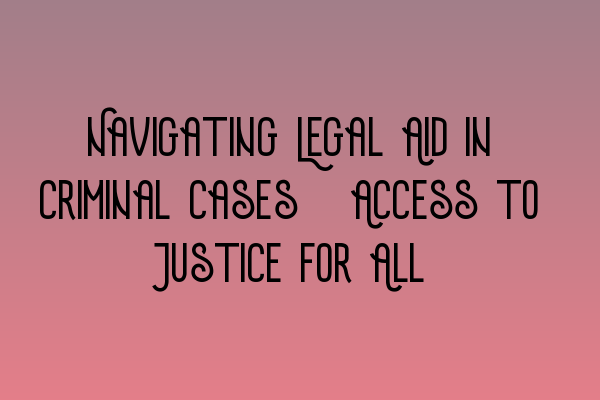Navigating Legal Aid in Criminal Cases: Access to Justice for All
At SQE Criminal Law & Practice Law UK, we understand the importance of access to justice for all individuals involved in criminal cases. Legal aid plays a vital role in ensuring that everyone, regardless of their financial situation, has the right to quality representation in court. In this blog post, we will explore how legal aid works in criminal cases and provide insights into navigating this system effectively.
What is Legal Aid?
Legal aid is a government-funded scheme that provides financial assistance to individuals who cannot afford legal representation or access to legal advice. In criminal cases, legal aid ensures that defendants have access to a solicitor, barrister, or legal advisor who can represent them in court and ensure their rights are protected.
However, it is essential to note that legal aid is means-tested, meaning that an individual’s financial circumstances will determine their eligibility for support. The criteria for eligibility may vary depending on the nature of the case, the complexity of the legal issues involved, and the person’s income and assets.
Navigating the Legal Aid System
Navigating the legal aid system can be complex and overwhelming. Understanding the eligibility requirements and knowing how to access legal aid is crucial for individuals involved in criminal cases. Here are some key steps to help navigate the system effectively:
- Evaluating Eligibility: The first step is to assess your eligibility for legal aid. You can use the SQE 1 Practice Exam Questions to test your knowledge and get an idea of the requirements.
- Consulting with a Solicitor: Consult with a criminal solicitor who specializes in legal aid cases. They will guide you through the process and assess whether you meet the eligibility criteria.
- Completing the Application: If you meet the eligibility requirements, your solicitor will help you complete the legal aid application. Ensure that all the necessary documents and information are provided accurately to avoid delays or rejection.
- Communicating with the Legal Aid Agency: Keep open lines of communication with the Legal Aid Agency. They may require additional information or documentation to assess your application.
- Understanding Cost Contributions: In some cases, individuals may be required to make a financial contribution towards their legal aid. It is essential to understand the cost implications and discuss them with your solicitor.
- Working with your Solicitor: Once legal aid is granted, collaborate closely with your solicitor. Provide them with all relevant information and cooperate throughout the legal process.
Importance of Access to Justice
Access to justice is a fundamental right that ensures fairness and equality within the legal system. Without adequate legal representation, individuals may struggle to understand complex legal processes, present their case effectively, or protect their rights. Legal aid plays a crucial role in bridging this gap and providing access to justice for all.
However, it is essential to note that the availability and quality of legal aid services may vary. It is crucial to seek reputable law firms that specialize in criminal law and have experience with legal aid cases.
Conclusion
Navigating the legal aid system can be challenging, but it is vital to ensure access to justice for all individuals involved in criminal cases. By understanding the eligibility criteria, seeking professional advice, and closely cooperating with solicitors, individuals can navigate the legal aid system effectively and secure quality representation.
If you’re preparing for the SQE exams, we recommend checking out our resources:
- SQE 1 Practice Mocks FLK1 FLK2
- SQE 2 Preparation Courses
- SQE 1 Preparation Courses
- SRA SQE Exam Dates
We, at SQE Criminal Law & Practice Law UK, are committed to promoting access to justice and providing comprehensive legal aid services to individuals involved in criminal cases. Contact us today to learn more!
Disclaimer: This blog post is intended for informational purposes only and should not be considered legal advice. Consult with a qualified solicitor for personalized guidance.
